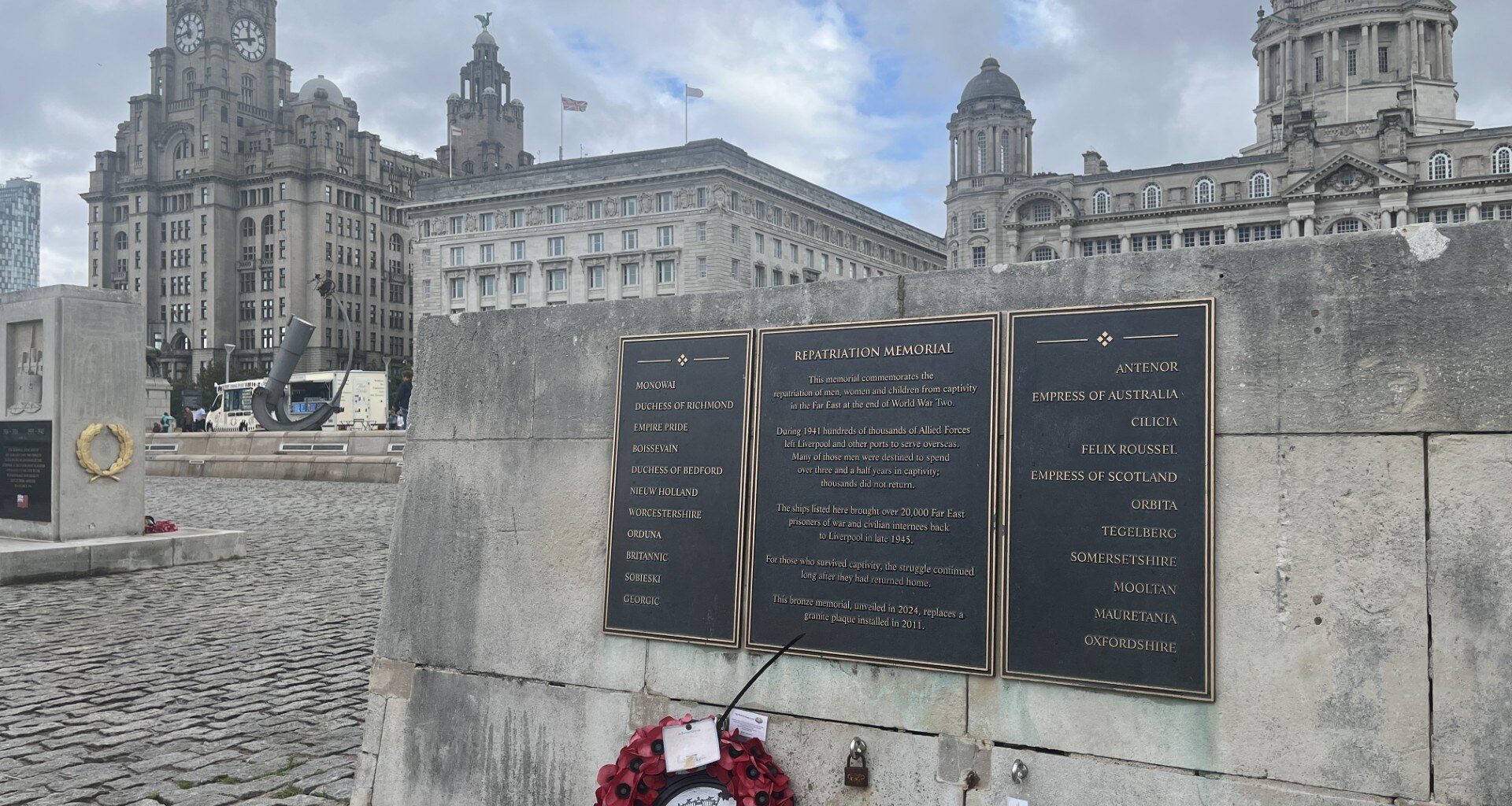On 15 August, eight decades will have passed since Japan surrendered in the Far East, finally ending the Second World War. A Service of Remembrance will be held at the Far East Prisoners of War (FEPOW) Repatriation Memorial on the Pier Head at 10.30am led by The Revd Canon Bill Addy of Liverpool Parish Church.
Civic buildings – Liverpool Town Hall, St George’s Hall, and the Cunard Building – will also be lit red, white and blue on Friday evening.
As well as civic dignitaries, who will lay wreaths at the memorial, there will also be a speech by Professor Geoff Gill, Emeritus Professor of International Medicine, Liverpool School of Tropical Medicine (LSTM) and the University of Liverpool.
The Far East Prisoners of War Prayer will be read by Meg Parkes MPhil, Honorary Research Fellow, LSTM, who is also the author of Notify Alec Rattray… about her father’s experiences as a FEPOW.
About 4,000 FEPOWS were supported and studied by LSTM as a result of the diseases they had endured in the prison camps such as amoebic dysentery, malaria and cholera. This led to LSTM’s longest running collaboration influencing the way service personnel are treated today. LSTM’s research also included the effects of PTSD before it become a recognised condition.
Friday’s service will conclude at about 11.30am, after which attendees are invited to remain at the Pier Head to take part in the national two-minute silence at noon.
To mark the end of the silence, vessels on the River Mersey, will sound their whistles at 12.02pm led by Cunard’s Queen Anne. Cunard’s ships played a significant role in the Second World War leading Prime Minister Winston Churchill to state that their involvement shortened the war by at least a year – with both the Queen Elizabeth and Queen Mary requisitioned and converted into troop transports.
Between 7 October and 12 December 1945, 22 ships carrying 20,000 FEPOWs and over 1,000 civilians docked in Liverpool and were formally welcomed by civic dignitaries before being taken to transit camps in Maghull and Huyton where they began their final journey to their homes across the UK.
Repatriation also took place through Southampton and the city will be holding a Remembrance Service at its FEPOW memorial. Lord Mayor of Liverpool Cllr Barbara Murray has written to the Lord Mayor of Southampton Cllr James Baille acknowledging the roles that the two cities played and sending Liverpool’s best wishes for Southampton’s event.
It is estimated that over 50,000 members of the British armed forces were imprisoned by the Japanese with a quarter dying often from tropical infections or undernutrition in prison camps throughout South East Asia, including on the infamous Thai-Burma, or so-called Death Railway.
About 130,000 civilians from Allied countries, including children, were also interned by the Japanese, including 2,800 mainly British nationals at the notorious Stanley Camp in Hong Kong.
Lord Mayor of Liverpool Cllr Barbara Murray said:
“Anniversaries such as these always contain moments of great sadness for all the lives that were lost, as well as pride and thankfulness for all those who fought and made the ultimate sacrifice for the freedoms we still enjoy today.
“In particular, it is very important that we keep in our thoughts all the men who suffered such desperate privations as POWs; a suffering that continued for so many as they tried to return to civilian life.
“It is therefore fitting that Professor Geoff Gill, of the Liverpool School of Tropical Medicine, joins us to mark this anniversary. LSTM’s work with the FEPOWs following their return is a powerful example of the good that can come from the very worst of circumstances.”
Professor Geoff Gill, Emeritus Professor of International Medicine, Liverpool School of Tropical Medicine and the University of Liverpool, said:
“Liverpool School of Tropical Medicine has had a long and proud association with surviving Second World War prisoners of war.
“In particular, we have seen over 4,000 of these men for detailed medical assessments, offering treatment and support for the many who have suffered long-term ill-health as a result of their experiences.”
